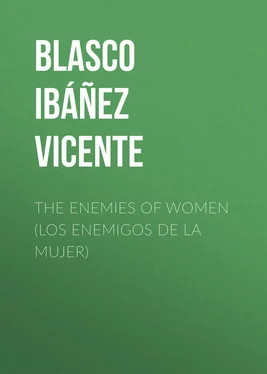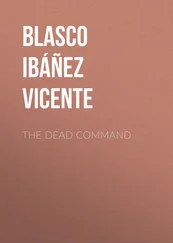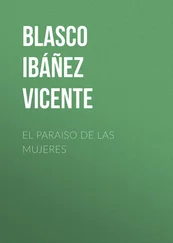Vicente Blasco Ibáñez - The Enemies of Women (Los enemigos de la mujer)
Здесь есть возможность читать онлайн «Vicente Blasco Ibáñez - The Enemies of Women (Los enemigos de la mujer)» — ознакомительный отрывок электронной книги совершенно бесплатно, а после прочтения отрывка купить полную версию. В некоторых случаях можно слушать аудио, скачать через торрент в формате fb2 и присутствует краткое содержание. ISBN: , Жанр: foreign_prose, foreign_antique, foreign_language, на английском языке. Описание произведения, (предисловие) а так же отзывы посетителей доступны на портале библиотеки ЛибКат.
- Название:The Enemies of Women (Los enemigos de la mujer)
- Автор:
- Жанр:
- Год:неизвестен
- ISBN:http://www.gutenberg.org/ebooks/38458
- Рейтинг книги:3 / 5. Голосов: 1
-
Избранное:Добавить в избранное
- Отзывы:
-
Ваша оценка:
- 60
- 1
- 2
- 3
- 4
- 5
The Enemies of Women (Los enemigos de la mujer): краткое содержание, описание и аннотация
Предлагаем к чтению аннотацию, описание, краткое содержание или предисловие (зависит от того, что написал сам автор книги «The Enemies of Women (Los enemigos de la mujer)»). Если вы не нашли необходимую информацию о книге — напишите в комментариях, мы постараемся отыскать её.
The Enemies of Women (Los enemigos de la mujer) — читать онлайн ознакомительный отрывок
Ниже представлен текст книги, разбитый по страницам. Система сохранения места последней прочитанной страницы, позволяет с удобством читать онлайн бесплатно книгу «The Enemies of Women (Los enemigos de la mujer)», без необходимости каждый раз заново искать на чём Вы остановились. Поставьте закладку, и сможете в любой момент перейти на страницу, на которой закончили чтение.
Интервал:
Закладка:
CHAPTER III
MICHAEL arrived in time to receive the body of the Princess in Paris. Before her death her mind had been illuminated by the sudden flare of reason which is the signal of the end in cases of serious mental disturbances. She had left various papers on which she had noted loans made to certain persons, and judicious suggestions for her son in regard to the management of the enormous fortune. She wanted to be buried beside her husband, her first husband, "the hero," in the Père Lachaise cemetery. During the last years she had stayed in Paris, she had been seized once more by the craze for building, and had busied herself with the preparation of her final dwelling place. Beside the mausoleum of the Marquis of Villablanca, whose image, frowning and indomitable, held in one hand a broken sword, she had set up another monument no less ostentatious with a statue which was supposed to be her exact likeness and was nothing less than the semblance of the unhappy Queen of Scots, as it appears in the engraving of the Romanticist period.
During the funeral ceremonies, Michael Fedor met again many persons who formerly visited the Lubimoff palace, and whom he had thought were dead. Doña Mercedes in tears embraced him. She had become extraordinarily stout, and the coppery complexion inherited from her Aztec ancestors had taken on an unhealthy ascetic pallor. She looked like the Mother Superior of a noble convent of nuns. At her side, Monsignor, in his silk cassock and with an air of compunction, was moving his lips to save the dead woman's soul. "My son! We have all our sorrows." And as she said this, the poor lady looked at another woman elegantly dressed in mourning who stood there somewhat aloof, in the cemetery, and seemed utterly incapacitated by the ceremony which had obliged her to rise before noon.
The Duchess de Delille also came forward to meet him, taking both his hands and giving him a strange glance.
"Your mother loved me … really loved me. During these last years we saw each other very often."
Michael nodded assent. He knew that already. The Princess Lubimoff had been the one loyal friend of this passionate unscrupulous woman, who was gradually losing every one's respect. She had defended Alicia when other high society women declared open war and closed their doors to her, fearing for their husbands' fidelity. As she used to play every winter at Monte Carlo, she had been in the company of the Princess up to the last moments.
"She loved me more than my mother ever did… Perhaps she remembered that I might have been her daughter."
The Prince walked away, as though annoyed by this allusion. He had heard such things about her!.. But all during the ceremony he kept seeing her in his mind's eye. She was still beautiful, but so strangely beautiful. Her skin had lost the golden tinge of ripened fruit, and now was pale, the dull white of Japanese paper. Her large eyes, which gave off green and yellow glints, stared with disturbing fixity and seemed at the same time to have a blank expression, as though covered by an invisible spider web. Her least bitter enemies accused her of a certain propensity for spirits. She drank all sorts of American mixed drinks like an habitué of the bars. Other people attributed her pallor and the continual darkly bewildered look in her eyes to morphine, opium and all the various liquids and perfumes producing lethargy and creating "artificial paradise." The little Alicia of former years was drinking, draining it to the last drop from the cup of life in deep draughts.
Michael Fedor thought that he had seen the last of her, but a few days later he began to receive letters. He was alone, and must be feeling sad, so she was inviting him to come and eat with her, informally, of course, as was natural among close relatives. His evasions brought fresh invitations by telephone. The Prince, like a person fulfulling a tiresome social obligation, finally went one evening to her little palace in the Avenue du Bois, one of the numerous imitations of the Petit Trianon, which are to be found in various parts of the world.
The Duchess de Delille was proud of this edifice and the tiny garden with its sharp, gilded grating, in front of which all fashionable Paris passed. Michael was acquainted with the drawing rooms without ever having been inside them. The illustrated journals, which cover the styles of wealthy social life, had published photographs, in Europe and America, of the interior of her residence. Gossip had kept him informed of Alicia's strange life. She had suddenly been taken with the mad desire of seeing people, of being admired, and of astonishing every one by her prodigality. She gave a series of great fêtes, and publicly protested because the municipality of Paris would not allow her to illuminate the entire Champs Élysées and the Arch of Triumph so that her guests might ride up to her very door in a fiery apotheosis. She had given a garden party in the Bois de Boulogne, with water sports, and dances of sacred dancers, brought from Asia. The buffet supper had been prepared for three thousand guests. On another occasion, for a single costume ball, she spent a hundred thousand francs, to transform part of her residence into an interior of Persian style and the next day she began to have the rooms restored to their original state.
Suddenly she would disappear, and people would wink and make malicious comments because she left no address. Some new love affair! Hers were nearly always wandering fancies, that called for long trips and new horizons! Perhaps she was in Constantinople or in Egypt; perhaps she was in hiding in one of the large New York hotels. At times such guesses were right; and then again the most intimate friends of the Duchess could affirm that she had not left Paris. Was not her automobile standing in front of the door?
This was another of Alicia's eccentricities. At all hours of the day and night, one of her various expensive cars was kept in readiness in front of the stairway. Three chauffeurs divided the service between them. They stayed in the porter's quarters; and as soon as the bell was heard, they had only to put on their gloves, run to the machine, and start the motor. She often chose the most extraordinary hours for going out. Sometimes it would be just after returning from a ball, then again she would get up for a ride after she had gone to bed. Frequently she would select the early morning hours which were usually her time of soundest sleep.
At times the chauffeurs would succeed each other, week after week, without leaving the gate of the mansion. The Duchess did not care to go out. She no longer felt her sudden impulses to ride aimlessly about Paris, while the city slept, pay unseasonable calls, or glide through the woods on the outskirts of the capital at the height of some violent storm. Meantime, the autos seemed to age, as they stood there motionless, now with their wheels deep in the snow of the courtyard, and again with the glass of the wind shield flecked with the tear drops of the slanting rain, that swept under the glass covered porte-cochère. During all such periods, Alicia, in spite of her restless impulsive nature, would be spending whole days in bed, telling her intimate friends that to keep one's beauty one must take a "rest cure" from time to time. She would entertain her friends at dinner without getting out of bed. The table would be spread in luxurious fashion in her large bedroom, and lying between the sheets, with the dishes within reach on a tiny table, she would laugh and chat for hours with her guests. Months would go by without her seeing the outside of her house, while the costly objects in her rooms, amassed to indulge her whims, were quite forgotten. Her vanity was satisfied, at such times, by the mere fact of having constructed a costly jewel case to harbor her idleness.
Читать дальшеИнтервал:
Закладка:
Похожие книги на «The Enemies of Women (Los enemigos de la mujer)»
Представляем Вашему вниманию похожие книги на «The Enemies of Women (Los enemigos de la mujer)» списком для выбора. Мы отобрали схожую по названию и смыслу литературу в надежде предоставить читателям больше вариантов отыскать новые, интересные, ещё непрочитанные произведения.
Обсуждение, отзывы о книге «The Enemies of Women (Los enemigos de la mujer)» и просто собственные мнения читателей. Оставьте ваши комментарии, напишите, что Вы думаете о произведении, его смысле или главных героях. Укажите что конкретно понравилось, а что нет, и почему Вы так считаете.












